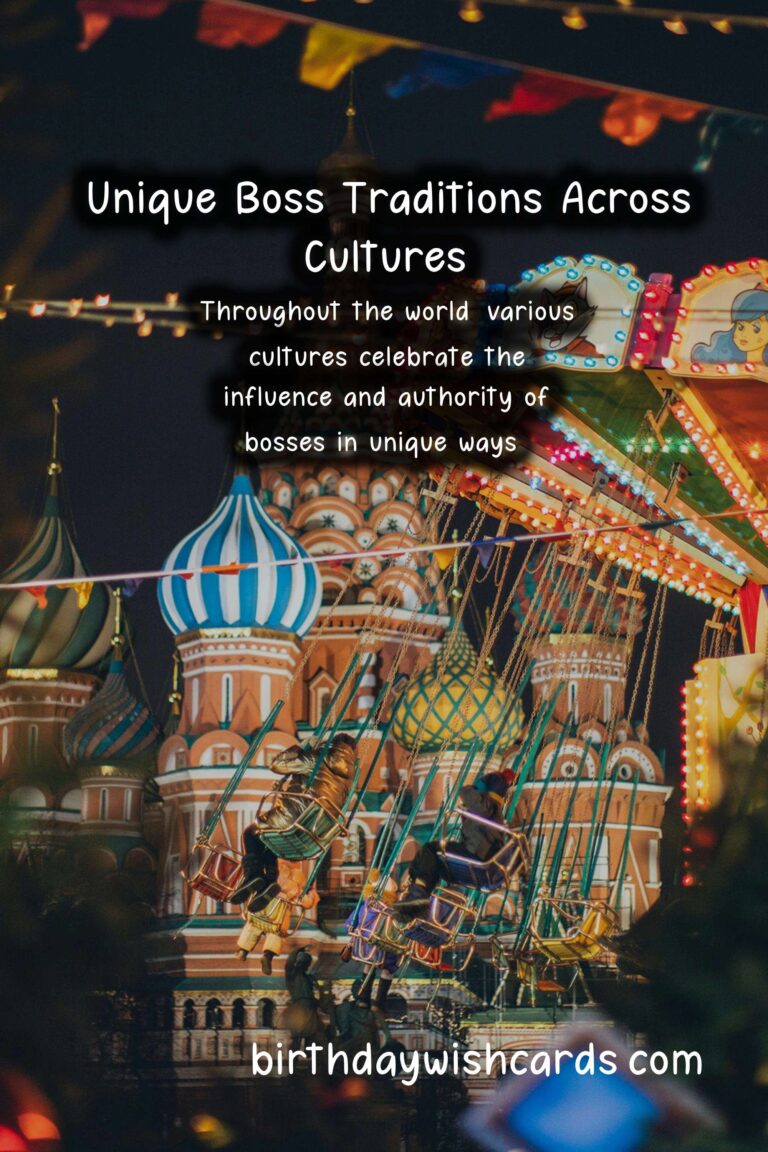
Throughout the world, various cultures celebrate the influence and authority of bosses in unique ways. Understanding these traditions can enhance workplace dynamics and improve relationships within professional settings. This article explores the fascinating traditions of bosses in several countries, revealing how they shape work culture and employee interactions.
1. Japan: The Importance of Harmony
In Japan, the concept of ‘wa’ or harmony is central to workplace relationships. One tradition that emphasizes this is the custom of ‘nomikai,’ which are after-work drinking parties held to foster camaraderie among staff. During these gatherings, bosses are expected to participate actively, helping to break down hierarchical barriers and build a more cohesive team.
Nomikai not only facilitates communication but also allows employees to voice their thoughts freely, which is often challenging in a formal office setting. This practice enhances trust and loyalty between staff and management.
2. Mexico: El Día del Jefe
In Mexico, ‘El Día del Jefe’ or Boss’s Day is celebrated on October 16th. On this day, employees express their appreciation for their bosses through small gifts, cards, or shared meals. This tradition reinforces respect for authority and acknowledges the role of leaders in guiding their teams.
Celebrating Boss’s Day creates an opportunity for employees to bond, showcasing gratitude and reinforcing positive workplace culture. In many organizations, this day is marked by team outings and festivities.
3. Italy: La Festa del Lavoro
Italy celebrates ‘La Festa del Lavoro’ or Labor Day on May 1st. While this day primarily honors workers, bosses also play a significant role in festivities. It’s common for bosses to treat their teams to a celebratory meal or event, promoting goodwill and camaraderie.
This tradition not only acknowledges the efforts of employees but also reinforces the value of teamwork and collective success, creating a strong bond between leaders and their teams.
4. South Korea: The Boss’s Birthday
In South Korea, it is a common tradition for employees to celebrate their boss’s birthday with a special gathering or event. This can range from a simple cake celebration at the office to a more lavish dinner outing. Employees often pool their resources to gift their boss a meaningful present, demonstrating respect and loyalty.
This tradition fosters a sense of gratitude and loyalty within the workplace and helps build a positive and supportive work environment.
5. Russia: The Salary Discussion
In Russia, it is customary for bosses to invite their employees to discuss salary adjustments or performance reviews in a more relaxed setting. This tradition creates a more open dialogue between employees and management, alleviating the often stressful nature of these discussions.
Such practices demonstrate that bosses value their employees’ input and are keen to foster a transparent and collaborative work atmosphere.
6. India: Diwali Celebrations
In India, the festival of Diwali is celebrated as a symbol of light and prosperity. Many companies engage in Diwali celebrations that include exchanging gifts and sweets between bosses and employees. This tradition signifies the appreciation and recognition of hard work and reinforces workplace relationships.
By celebrating such festivals together, teams create stronger bonds and enhance the overall workplace culture.
7. Brazil: The Monthly Appreciation Event
In Brazil, it is common for companies to hold monthly events where bosses recognize and appreciate employees’ contributions. These events can involve awards, certificates, or even presentations highlighting individual successes.
This tradition not only motivates employees but also demonstrates that bosses are invested in their team’s growth and success.
8. France: Acknowledging Successes
In France, it is customary for bosses to acknowledge the team’s successes during meetings. This practice involves celebrating collective achievements, emphasizing the importance of teamwork over individualism.
By highlighting successes, bosses reinforce the value of collaboration, fostering a motivating environment within the workplace.
9. Philippines: The ‘Salu-salo’
In the Philippines, bosses often host ‘salu-salo’, a communal feast that brings together employees to celebrate milestones or achievements. This tradition not only creates a festive atmosphere but also strengthens interpersonal bonds within the team.
Bosses play a significant role by facilitating such gatherings, showcasing their leadership through inclusivity and celebration.
10. Conclusion
Understanding the unique traditions of bosses across different cultures provides valuable insights into how workplace relationships are developed and nurtured. These customs emphasize the importance of appreciation, respect, and inclusivity, vital components of a thriving work culture.
By embracing and participating in such traditions, organizations can build a more harmonious and collaborative work environment, ultimately leading to greater success.
Throughout the world, various cultures celebrate the influence and authority of bosses in unique ways. Understanding these traditions can enhance workplace dynamics and improve relationships within professional settings. 













